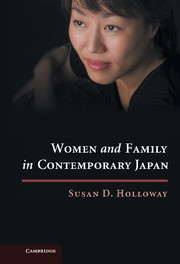Preface
Published online by Cambridge University Press: 05 June 2012
Summary
In 1990, in an article in the Annual Review of Anthropology entitled “Women's Voices: Their Critique of the Anthropology of Japan” Mariko Tamanoi argued forcefully that the perspectives of Japanese women have received shockingly little attention in the academic literature:
Before women's perspectives can be integrated successfully into the study of Japanese culture and history, we must listen to what women have to say about their own experiences, emotions, and thoughts. Their voices, not yet sufficiently explored, may lead to different views of Japanese culture and history. Thus, to focus on women is not to ghettoize them but to include their subjective experience in the study of Japan. It means seeing Japanese culture and history from the vantage points of women, who in recounting their experiences and emotions must talk about the lives of their male partners and/or competitors as well.
(p. 18)Tamanoi's call for closer study of Japanese women's perspectives is still relevant today. Although a growing number of anthropologists, political scientists, and sociologists have focused on recent changes in the Japanese family, relatively few have focused directly on the voices of contemporary Japanese mothers. As a psychologist, I wanted to focus on women's perceptions of what the role of mother entails and how they evaluate themselves in that role. In light of the initial evidence that many Japanese mothers perceived themselves as inadequate, I also hoped to uncover what types of experiences bolstered (or diminished) their sense of confidence – referred to by psychologists as self-efficacy – in pursuing this role.
- Type
- Chapter
- Information
- Women and Family in Contemporary Japan , pp. vii - xiiPublisher: Cambridge University PressPrint publication year: 2010

